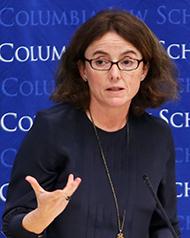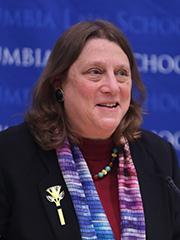EU Official Maria Martin-Prat Addresses Future of Copyright in Europe at 27th Annual Manges Lecture
New York, April 22, 2014—The European Union is trying to enact a single copyright regime to replace individual member nations’ copyright laws and balance the interests of content creators and consumers, said Maria Martin-Prat, head of the copyright unit in the European Commission Internal Market Directorate General (DG MARKT), in the 27th annual Horace S. Manges Lecture at Columbia Law School April 7.
| Maria Martin-Prat delivered the 2014 Horace S. Manges Lecture. |
Following an introduction from Jane C. Ginsburg, the Morton L. Janklow Professor of Literary and Artistic Property Law and faculty director of Columbia Law School’s Kernochan Center for Law, Media, and the Arts, Martin-Prat began her speech with an overview of the complex web of copyright law in Europe, which spans statutes from individual nation-states, directives from the European Union, and rulings from the Court of Justice of the European Union.
“My view is that careful review of copyright law is needed to maintain the legitimacy of the system, and it must be done on a European rather than national level,” Martin-Prat said. “For instance, protection of software is partially based in various directives across layers of statutory authority and different laws over 20 years, so there is much uncertainty and inconsistency.”
Martin-Prat, who previously served in various senior positions in the European Commission and European Parliament as well as working as deputy general counsel and director of legal policy and regulatory affairs for the International Federation of the Phonographic Industry, argued that member states’ diverse copyright statutes interfere with procuring compensation for content creators and that ongoing harmonization of laws provide an opportunity for reform.
“Member states are locked into the harmonization process of the last two decades, which aims to eliminate legislative differences that might interfere with optimal functioning of the common market,” Martin-Prat said. “We must strike a fair balance between producers of media and consumers of media.”
| Professor Jane C. Ginsburg, faculty director of the Kernochan Center, introduced Martin-Prat. |
Martin-Prat suggested that the dissemination of perfect digital copies on the Internet and evolving concepts of ownership and infringement warrant rethinking copyright to anticipate further change.
“Social media sharing and peer-to-peer have strained fundamental notions of ownership and copies,” Martin-Prat said. “The more technology accelerates, the less copyright law should depend on technology-bound concepts.”
Martin-Prat concluded that, whatever the potential benefits, it may prove difficult to replace the laws of some 28 individual states with a single European code.
“It’s not going to be simple to do away with territoriality,” Martin-Prat said, “but we should try.”

